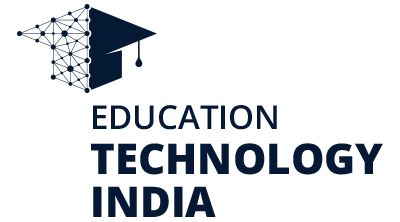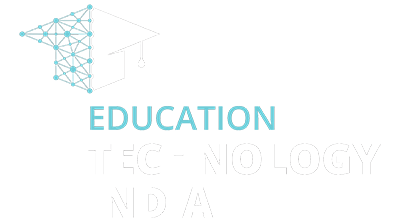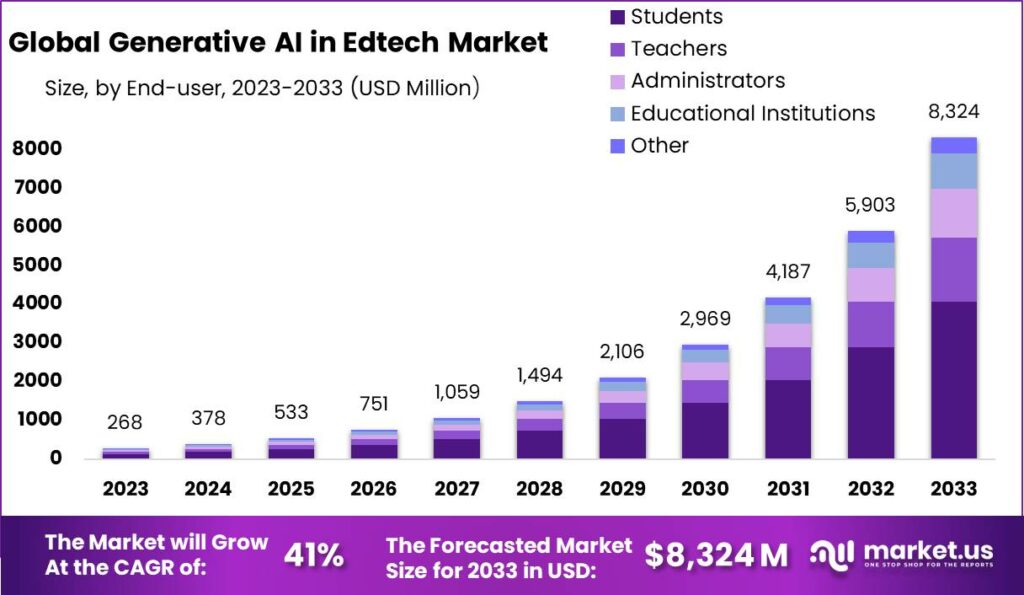The Generative AI in Edtech market is experiencing remarkable growth, with projections indicating a surge to around USD 8,324 million by 2033, reflecting a Compound Annual Growth Rate (CAGR) of 41% from 2024 to 2033. This expansion is fueled by several pivotal factors, including escalating demand for adaptive learning and personalized education, driven by notable advancements in natural language processing and computer vision technologies. These advancements enable more dynamic and customized learning experiences, effectively addressing the diverse needs of learners across various domains such as language acquisition, skills enhancement, and corporate training.
The incorporation of Generative AI into educational platforms holds the potential to transform the sector by facilitating the generation of tailored content, spanning text, images, and virtual environments, aligned with specific learning objectives. For educators and learners alike, this technology offers unprecedented support, fostering interactions akin to human engagement and enhancing the overall learning journey. Furthermore, the scalability and cost-effectiveness of Generative AI render it an appealing prospect for the Edtech industry, promising substantial value in terms of educational outcomes and operational efficiencies.

Facts and Recent Statistics:
- The Generative AI in Edtech market is anticipated to reach a valuation of approximately USD 8,324 million by 2033, rising from USD 268 million in 2023, with a projected compound annual growth rate (CAGR) of 41%.
- In 2023, Adaptive Learning accounted for a substantial market share of over 39%, underscoring its efficacy in tailoring educational experiences to individual learner preferences, pace, and requirements.
- Students constituted over 49% of the market share in 2023, indicating the direct influence of generative AI technologies on enhancing global student learning experiences.
- North America emerged as the market leader in 2023, with demand valued at USD 39.1 million, driven by robust technological infrastructure, significant investments in educational technology, and a culture of innovation.
- The Generative AI market is poised for significant growth, expected to reach approximately USD 255.8 billion by 2033, showcasing an impressive annual growth rate of 34.2%.
- Over 73% of individuals satisfied with Generative AI usage in education are from the Asia-Pacific (APAC) region.
- 50% of surveyed organizations have decided to increase investment in Generative AI technologies.
- 44% of organizations are experimenting with Generative AI in pilot programs, while 10% have already implemented it for real tasks.
- By 2030, AI is predicted to contribute a substantial 21% net increase to the GDP of the United States.
- In 2024, more teachers and schools in the AMER (Americas) region are expected to adopt Generative AI.
- Generative AI is viewed as a significant opportunity to revolutionize the learning and teaching landscape, enhancing education globally.
- Generative AI is increasingly applied across various Edtech applications, including personalized learning, language translation, virtual and augmented reality integration, grading and assessment, career advice, and gamification.
- Educational institutions employing Generative AI for content creation and course development experienced a notable 25% reduction in time and costs in 2023.
- The integration of Generative AI with emerging technologies such as Virtual Reality (VR), Augmented Reality (AR), and blockchain presents substantial prospects for creating immersive learning experiences and transparent educational achievements.
- Key players influencing the market include Microsoft Corporation, Google LLC, Cognii Inc., Knewton, Blackboard, Metacog Inc., and Duolingo, each contributing to driving innovation and AI adoption in education.
Emerging Trends:
- Explainable AI in Education: Generative AI models are increasingly focusing on explainability and transparency, providing insights into their decision-making processes to aid understanding.
- Ethical AI in Education: There’s a growing emphasis on addressing ethical concerns regarding bias, privacy, and data security in the use of Generative AI in EdTech.
- Collaborative and Co-creative AI: AI systems are being developed to facilitate collaboration between students and educators in the generative process.
- Multimodal Generative AI: There’s a trend toward integrating multiple modalities to enable AI models to generate and understand content across different mediums.
- Context-Aware Generative AI: AI models are being trained to adapt to specific educational contexts, providing personalized learning experiences tailored to individual needs.
Use Cases of Generative AI in Edtech:
- Personalized Learning Materials
- Content Generation for Educators
- Language Learning Assistance
- Interactive Learning Environments
- Automated Essay Scoring and Feedback
- Enhanced Accessibility
- Support for Creativity and Design
Recent Developments:
- Duolingo introduced Duolingo Max, a subscription service leveraging smart AI for personalized language learning.
- Knowlton partnered with McGraw-Hill Education to develop AI tutors for personalized student assistance.
- Microsoft invested in Intuition Machines, an Israeli startup focusing on personalized learning experiences through AI.
- Google’s research team is working on AI-driven adaptive learning materials tailored to students’ needs.
In Conclusion:
The Generative AI in EdTech market is rapidly expanding, transforming education with personalized learning experiences and innovative tools. Emerging trends emphasize explainability, ethics, collaboration, multimodal capabilities, and context awareness, catering to diverse learner needs. This expansion is enhancing education’s accessibility, interactivity, and effectiveness, promising a future where learning is more engaging, inclusive, and impactful globally.
Source: Market.us scoop






